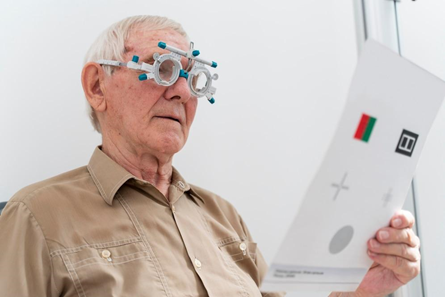Understanding The Importance Of Eye Health For Seniors
As we age, maintaining eye health is essential for quality of life. Seniors are more vulnerable to vision problems that can impact independence. Regular eye exams and personalized care can help prevent or manage these issues.
Good vision is crucial for daily activities like reading and navigating surroundings. Neglecting eye health can lead to falls, accidents, and reduced quality of life. Prioritizing routine check-ups ensures early detection and treatment of common conditions.
Caregivers play a key role in supporting senior eye health. Ensuring regular exams and staying informed about treatment options can help protect their vision and overall well-being.
Common Eye Conditions In Older Adults
Aging affects vision, making seniors more susceptible to eye conditions, and understanding these issues helps in providing better care. Cataracts, which cause cloudy vision and develop gradually, are treatable with surgery. Glaucoma, known as the “silent thief of sight,” increases eye pressure and damages the optic nerve, making early detection through screenings crucial. Age-Related Macular Degeneration (AMD) affects central vision, hindering tasks like reading and driving, and while incurable, treatments can slow its progression. Regular eye exams are vital for detecting these conditions early, enabling timely intervention and better preservation of vision.
The Role Of Caregivers In Eye Health Management
Caregivers play a vital role in maintaining seniors’ eye health by scheduling regular eye exams for early detection of vision issues, managing treatments such as administering eye drops and encouraging healthy habits, and educating themselves to advocate effectively for their loved ones. Proactive caregiving helps preserve vision and enhances seniors’ quality of life.
Preparing For A Senior Eye Exam
Proper preparation for a senior eye exam involves gathering essential medical information, such as a list of medications, past eye conditions, surgeries, and family history, to provide the eye care professional with a comprehensive view of the senior’s health. Caregivers should also communicate with the senior, explaining the exam process, addressing any concerns, and reassuring them to reduce anxiety. Additionally, planning logistics, such as arranging reliable transportation and allowing enough time for the visit, ensures the senior is comfortable and punctual. Thorough preparation helps ensure a smooth, stress-free experience, allowing for a more effective eye exam and better outcomes.
What To Expect During A Senior Eye Exam
A comprehensive senior eye exam includes several key tests to assess vision and overall eye health. The Visual Acuity Test measures sharpness of vision using a letter chart, while the Refraction Assessment determines the correct prescription for glasses or contacts. The Eye Muscle Test checks for any weaknesses or coordination issues in the muscles controlling eye movement. Pupil Dilation, achieved through eye drops, allows the doctor to examine the retina and optic nerve thoroughly. Encouraging seniors to ask questions and express concerns during the exam helps ensure a more personalized and thorough care experience, addressing any specific needs or discomforts they may have.
Personalized Eye Care Plans For Seniors
Implementing a senior eye care plan is essential for maintaining vision and overall well-being. Caregivers should ensure that seniors wear and properly maintain their prescription glasses or contact lenses. For those requiring medications, such as eye drops for glaucoma, adherence to schedules and monitoring for side effects is crucial. Additionally, promoting a healthy lifestyle, including a nutrient-rich diet with omega-3s and vitamins C and E, can support eye health. By working closely with eye care professionals, caregivers can help seniors follow a tailored plan that preserves vision and enhances their quality of life.
Tips For Caregivers In Supporting Eye Health
Supporting senior eye health requires a proactive approach. Caregivers should facilitate regular eye exams for early detection of issues and encourage adherence to personalized care plans. Staying informed about eye health and educating seniors can empower them to make informed decisions about their vision. Creating a safe, well-lit environment with simple modifications, such as brighter lighting and enhanced contrast on stairs, helps prevent accidents and supports independence. Alpenglow Homecare specializes in creating personalized care plans to address these challenges. For more information, visit https://alpenglowcaresmt.com/. By integrating these strategies into daily routines, caregivers can help maintain seniors’ vision and overall well-being.
The Future Of Eye Care For Seniors
Advancements in technology and research are transforming eye care, offering new possibilities for diagnosis, treatment, and prevention. As caregivers, staying informed about these developments ensures we provide the best care for our seniors.
Emerging technologies like AI are enhancing diagnostic accuracy, while telemedicine offers convenient remote consultations, especially for seniors with mobility challenges. Research into new treatments, such as gene therapy and regenerative medicine, holds the potential to restore vision in the future.
By staying updated on these innovations, caregivers can proactively explore new treatment options, advocating for the best care to improve their seniors’ eye health and overall well-being.
Conclusion: Prioritizing Eye Health For A Better Quality Of Life
Prioritizing eye health is essential for maintaining seniors’ independence and quality of life. As caregivers, we play a crucial role in managing eye care by scheduling regular eye exams, educating seniors on the importance of eye health, and ensuring adherence to prescribed treatments. Staying informed about common eye conditions and advancements in treatment options allows us to prevent vision loss and improve daily living. Additionally, creating a safe environment and encouraging protective measures like UV-blocking sunglasses can prevent falls and enhance well-being. Let’s commit to prioritizing eye health for our seniors, ensuring they live with clarity and confidence. For guidance, consult an eye care professional to make a meaningful impact on their eye health.








